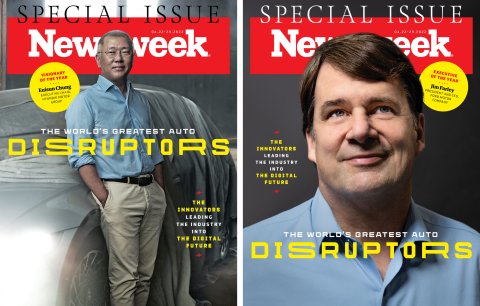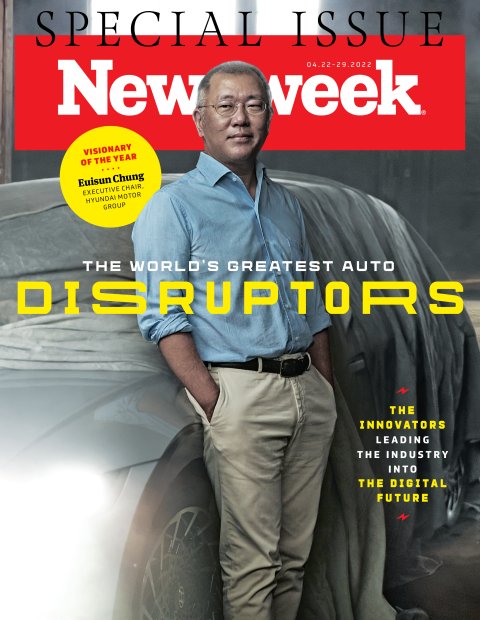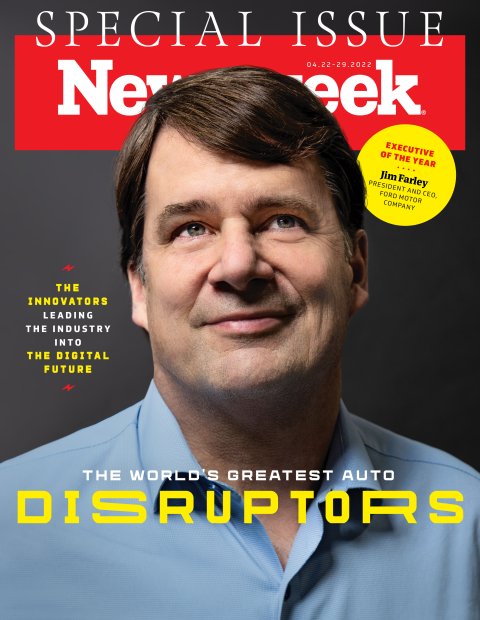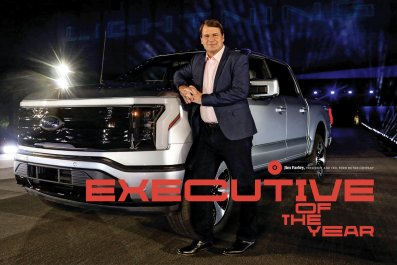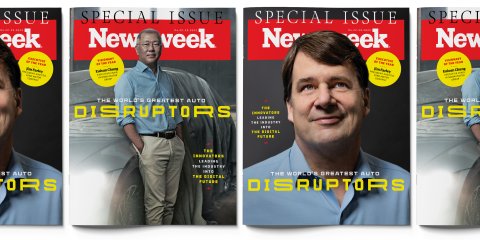
Progress in the auto industry used to just be about the cars—how they drove, what they looked like, how much they cost, how comfortable they were and how safe. Those things still matter greatly, of course, but now, the automotive landscape is far vaster. As technological advances expand the possibilities of what a car can be and new challenges—from climate change to the pandemic—present themselves, innovation in the auto world is extending into new vistas, including sustainability, mobility, alternative fuels and a full embrace of the digital future.
Cars, in other words, aren't only vehicles anymore, getting you from Point A to Point B. They can be entertainment systems, tech centers, home offices and information hubs. They can be problem solvers, helping to address issues like carbon emission, soaring gasoline prices and mobility challenges. And they can be fully digital products, versus simply modes of transportation, serving a multitude of purposes, in ways that benefit both consumers and the bottom line of the carmakers that produce them.
During this period of transformative change in the industry, a few bold leaders stand out, judged by their determination to meet the challenges of the digital future, and their skill in bringing the cars of today into tomorrow with vision, speed and technological prowess. These carmakers have been pushing harder than their peers, making quicker business pivots and going audaciously forward in ways that upend the usual flow of business.
These leaders are, in Newsweek's assessment, the World's Greatest Auto Disruptors. The achievements of these carmakers are all the more impressive given that they've occurred during a period of extraordinary dislocation in the auto industry. For car companies, the challenge of 2021 wasn't just about how to keep making vehicles and sustain buyer interest amidst a global pandemic. It was, and still is, about continuing to make progress in the face of uncertainty as a plethora of related issues roil the industry, from potentially crippling shortages of raw materials and technological components to dramatic shifts in consumer interest and shopping behavior.
Reimagining Speed and Style
Figuring out how to quickly respond to those challenges, to generate the profits needed today to finance the innovations of tomorrow, is paramount. But moving fast hasn't traditionally been the norm in the auto industry.
Every new car begins life as a simple stroke of a pen. The complex process of car design, from that initial pen stroke (or perhaps stylus these days) to putting a vehicle on the road, can take years to execute. A new model might start the development process nearly a decade before its final form reaches the consumer.
Companies bent on speeding up this traditional cadence of design and redesign are taking advantage of technological advances to be primary drivers of disruption in the automotive world. Efficiencies in development and design come thanks to breakthroughs such as three-dimensional printing and simulated testing scenarios—for example, using a computer simulation in place of on-site physical crash tests and photographic analysis—allowing automakers to accelerate long-awaited changes to their lineups in ways that would not have been possible a decade ago.
Case in point: Nissan, which began a transformative brand design evolution in mid-2020, promising to launch 12 refreshed and redesigned models in under two years as part of a larger four-year company turnaround plan. Models that were known for sameness with a focus on comfort rather than attitude have since evolved into having unique identities, from a more brutish truck family to a generational makeover of a newly sleek Z, the company's hallmark sports car, and the introduction of Nissan's first all-electric SUV, the stylish Ariya.
Each has been touched by a design team led by Alfonso Albaisa, senior vice president for Global Design for Nissan Motor Co., Ltd. Albaisa is the 2022 winner of Newsweek's Auto Disruptors Designer of the Year award. (For more on Albaisa and all our winners, see the profiles that follow.)
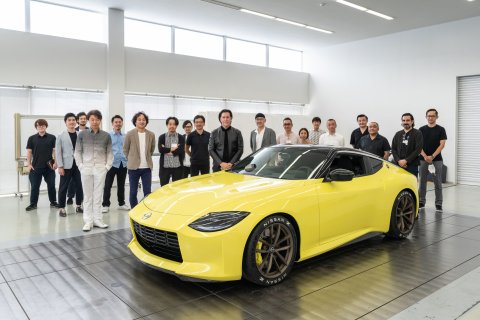
"As the head of design for both Nissan and Infiniti, Albaisa has worked hard to bring unique and appealing design identities to each brand," Ed Kim, president and chief analyst at AutoPacific tells Newsweek. "His role in the rapid overhaul of Nissan's product lineup has been crucially important. Not only do the latest Nissan products have a lot more attitude and personality, but they bring design passion to a brand that had lost some of its mojo last decade."
Strategic partnerships with technology companies are also key to the disruption now taking place across the industry. These have allowed for large investments in computing that touches every part of a vehicle, from the gauge cluster and infotainment screen to crash prevention and fuel management.
Technology disruptors aren't just pushing development, they're expediting implementation. More crash prevention software comes standard on vehicles now than ever before, for example, and are available at lower price points than in previous years.
Leaders in the field are also moving the ball on what it means to be a base model. Gone are the days when an entry-level car had an entertainment screen with radio functionality and little else. Large screens compatible with today's freshest smartphone technology are becoming commonplace across lineups.
Disruptors, though, are going bigger and bolder. Jeep, for example, has added the option of an entertainment screen in front of the first-row passenger in its upmarket models. Mercedes-Benz has introduced the Hyperscreen, a wide display of illuminated instrumentation and infotainment that stretches across the entire dashboard area, in the EQS, its all-electric luxury sedan. Cadillac has launched a 38-inch OLED display that goes nearly pitch black upon request. Lucid's Glass Cockpit is a 34-inch 5K display.
Autos as Information Hubs
Technological innovation in the industry isn't reserved for family vehicles. Work trucks no longer have just the bare minimum that consumers require either. Disruptors in that space are collecting information from connected fleet and commercial vehicles and using it to create a product that can link vehicles to infrastructure and each other, utilizing partnerships with tech giants like Google and Amazon. Known as vehicle-to-everything, or V2X, the technology enables a vehicle to use its on-board communication tools to deliver real-time traffic information, preemptively react to changing road conditions, recognize road signs and warnings, communicate with other vehicles and more.
Ford, whose president and CEO Jim Farley wins Newsweek's Auto Disruptors Executive of the Year award for 2022, is a leader here. Its Ford Pro Intelligence is a software hub for fleet management that can be used with Mercedes-Benz, Volkswagen and other automakers' brands to help commercial customers manage their vehicles and drivers in ways that benefit the bottom line. Software shows downtime, uptime and energy efficiency achieved, while allowing users to schedule maintenance, all from the same program.
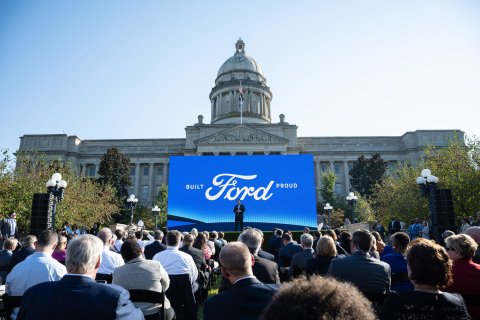
It's all part of Farley's larger plan, perhaps the ultimate disruption in the industry, to change how autos are seen, from "just cars" to digital products, without losing their historic identity. It's not about technology for technology's sake but rather purpose-driven and a shift to electric cars is central to the strategy.
"Farley has created a sense of purpose and urgency within Ford to accelerate the transition to electric vehicles, which could be risky if the momentum of today falters," Stephanie Brinley, principal analyst at S&P Global Mobility tells Newsweek. "His approach not only includes pushing the company to test how things are done; he also harnesses the past to focus Ford's forward motion. Using icons like Mustang and F-150 and the company's success in the commercial space to propel Ford forward ensures the closest possible relationship to the company's identity."
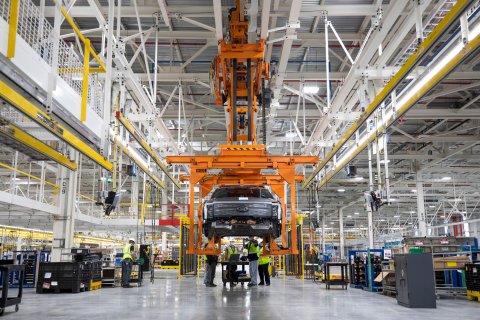
Pushing forward on next-generation development of electrified and electric vehicles is key to many carmakers' strategy these days, especially as connected technologies allow EVs to be more compatible with consumer lifestyles. With the ability to locate fuel filling stations and charging points via in-car navigation, then route according to those places of interest, the tech has made itself into an invaluable resource for today's drivers, who often cite range anxiety as one of the top factors deterring them from buying an EV.
Fueling the EV evolution are battery packs that have grown larger and seen chemistry changes in recent years that allow for longer estimated driving ranges. No longer are automakers retrofitting architecture to make it work with battery power. Instead, they are building platforms explicitly for electric models that include flat floors and reconfigurable passenger space, as seen in the Hyundai Ioniq 5.
Porsche was first to come to market with 800-volt charging technology, which typically shortens the time needed to get a full charge by half. For the Porsche Taycan, that means nearly a full charge in about 20 minutes.
Hyundai Motor Group, the parent company of the Hyundai, Genesis and Kia brands, has taken that technology and employed it on vehicles that are one-third the price of the Taycan. The democratization of this tech, which puts electric cars in affordable reach for many more drivers, is a key disruptive force in the industry. It also helps accelerate the shift to alternative fuels—all part of the reason why Hyundai Executive Chairman Euisun Chung wins Newsweek's Auto Disruptors Visionary of the Year award.
"Deploying 800-volt technology more quickly than competitors positions Hyundai Motor Group as a leader in EV technology, and is demonstrative of Hyundai's overall approach to deliver more than consumers expect at the price points each of the company brands play in," Brinley says. "The move also shows Hyundai's approach to deploy technology widely across brands in an effort to scale more quickly."
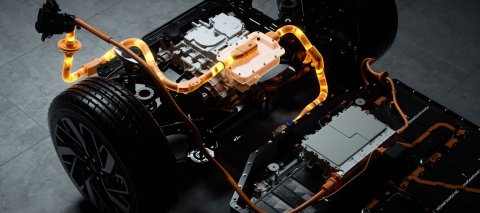
The strategy is not without possible hiccups. "The risk is being ahead of the infrastructure," says Brinley, since currently the U.S. only has about 4 percent of the public charging stations needed to meet projected EV demand. "It does give consumers fast-charging technology [but it's tech] they can't easily access and may not know when they can."
An Electrified Future
Evolving battery technology has led to partnerships and large investments within the industry. General Motors, for example, is investing billions in a battery-cell manufacturing joint venture with LG. The company is currently constructing battery plants in Ohio, Michigan and Tennessee.
Ford, meanwhile, has broken ground at BlueOval City, a combination battery plant and research and development center in Kentucky that merges the future of electrified powertrains with the promise of a future circular product lifecycle. And Hyundai Motor Group is going a step further, working to vertically integrate the entire vehicle manufacturing process through partnerships and investments.
Beyond production of the EVs of tomorrow, automakers are expanding into the mobility space, planning for a more automated future. Among the boldest moves: Hyundai's $880 million purchase last year of a controlling interest in Boston Dynamics, a leading robotics firm.
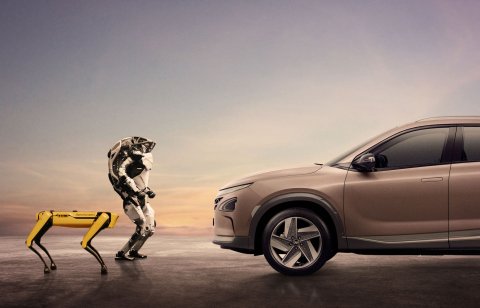
"Hyundai Motor Group has become one of the most innovative automakers today as it aggressively embraces the future and looks outside of the traditional automotive box," Kim says. "In a local business environment where large companies like Hyundai are often associated with formality and tradition, Chung's youth and vision have seen the automaker do away with a lot of both. He has led the company from being an accomplished fast follower to a true innovator. Flying taxis, autonomous shuttles and robots are out of the traditional automotive realm, but under Chung's leadership, they're part of the company's larger vision for leadership in mobility."
These moves don't just disrupt the future of automotive, they're disruptive to the lifestyle of drivers, riders and owners. That's the point—and the promise. And that future is nearly here.
******
How We Picked the Auto Disruptors of the Year
For its initial list of candidates, Newsweek asked America's automakers to submit nominations for the World's Greatest Auto Disruptors awards from within their ranks. Then, led by Newsweek Senior Autos Editor Eileen Falkenberg-Hull, the Autos team combed through a year's worth of infotainment, powertrain, platform, marketing, business and other advances in the industry to further identify the accomplishments of nominees. To be considered, candidates had to be employing technology, marketing or vision in a way that is driving fundamental, transformative change in the automotive market, with measurable real-world results—or have clear and demonstrable potential to do so. The list was then narrowed by the Autos team, which includes editor Jacob Lingeman and writers Tatiania Perry and James McCandless. Winners were chosen after a consensus was reached among the Autos team and Newsweek top editors.
